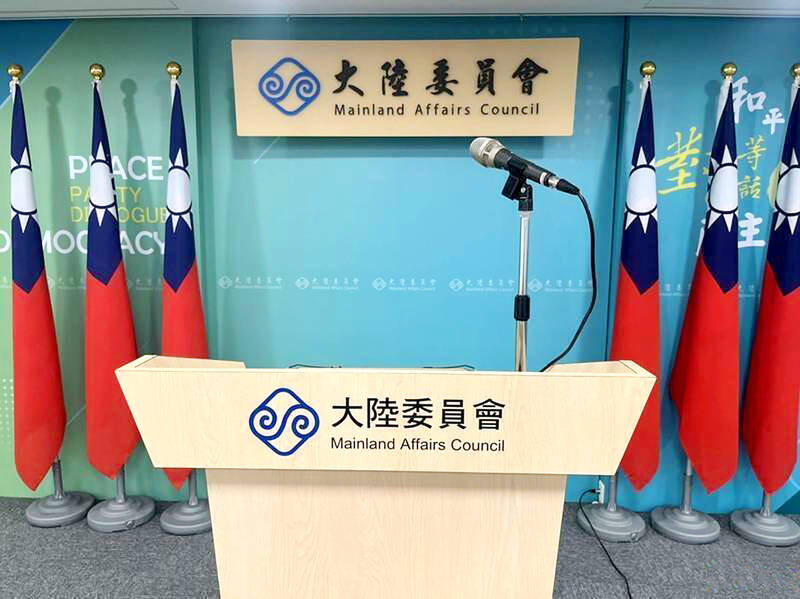A sailor whose mother reportedly applied for a Chinese ID card on his behalf can keep his Taiwanese citizenship, the Mainland Affairs Council (MAC) said on Thursday.
The man, surnamed Yang (楊), serves in the navy’s 168th Fleet and holds a Chinese ID card, which was obtained 10 years ago by his Chinese mother.
The council met with the Ministry of the Interior and the Ministry of National Defense on Thursday to discuss the situation.

Photo: Taipei Times
Yang’s mother applied for the card when he was a child, even though he explicitly expressed unwillingness to get one, the MAC said.
On Wednesday, he applied to Chinese authorities to annul his household registration in China, it said.
The government would not require Yang to travel to China to carry out the annulment procedure, as he is an active-duty soldier who is restricted from visiting China as a matter of national security, it said.
Given that Yang sought assistance from the government and took action to relinquish his Chinese citizenship, the agencies decided to retain his Taiwanese citizenship, the MAC said.
The decision was made in accordance with Article 9-1 of the Act Governing Relations Between the People of the Taiwan Area and the Mainland Area (台灣地區與大陸地區人民關係條例), which stipulates that in special cases, people can be exempt from revocation of Taiwanese citizenship, it added.
The act stipulates that Taiwanese with a household registration in China or a Chinese passport would have their Taiwanese citizenship revoked and lose the rights to vote, recall, initiative and referendum, as well as other rights derived from Taiwanese citizenship, including serving in the military or public service, the council said, adding that the government would strictly impose the punishment on those who contravene the act.
To prevent Yang from stress due to intense public attention, the Ministry of National Defense and his supervisors would provide counseling and assistance, the MAC said.
His role and responsibilities would be properly rearranged to help develop his military career after the ministry completes its investigation, the council added.
MAC Deputy Minister and spokesman Liang Wen-chieh (梁文傑) said there are likely to be more cases of parents who applied for Chinese IDs on behalf of their children.
Many Taiwanese businesspeople in China possess Chinese IDs, as they had children and registered their residence there before moving back to Taiwan, he said.
Investigations would continue, with civil service agencies mobilized to aid the effort, Liang said.
From 2014 to last year, 676 people were stripped of their Taiwanese citizenship for possessing Chinese IDs, he said.
Taiwanese and Chinese citizenships have been mutually exclusive for the past 30 years, but the rule has been bent in China’s Fujian Province, where authorities do not require people to submit Taiwanese documents when applying for a Chinese ID, Liang said.
Taekwondo athlete Lee Tung-hsien (李東憲) and Su Shih-en (蘇士恩) had their Taiwanese citizenship revoked due to concurrent possession of Chinese citizenship, he said, calling on Beijing not to compromise the rules in its efforts to promote integrated cross-strait development.

The manufacture of the remaining 28 M1A2T Abrams tanks Taiwan purchased from the US has recently been completed, and they are expected to be delivered within the next one to two months, a source said yesterday. The Ministry of National Defense is arranging cargo ships to transport the tanks to Taiwan as soon as possible, said the source, who is familiar with the matter. The estimated arrival time ranges from late this month to early next month, the source said. The 28 Abrams tanks make up the third and final batch of a total of 108 tanks, valued at about NT$40.5 billion

Two Taiwanese prosecutors were questioned by Chinese security personnel at their hotel during a trip to China’s Henan Province this month, the Mainland Affairs Council (MAC) said yesterday. The officers had personal information on the prosecutors, including “when they were assigned to their posts, their work locations and job titles,” MAC Deputy Minister and spokesman Liang Wen-chieh (梁文傑) said. On top of asking about their agencies and positions, the officers also questioned the prosecutors about the Cross-Strait Joint Crime-Fighting and Judicial Mutual Assistance Agreement, a pact that serves as the framework for Taiwan-China cooperation on combating crime and providing judicial assistance, Liang

A group from the Taiwanese Designers in Australia association yesterday represented Taiwan at the Midsumma Pride March in Melbourne. The march, held in the St. Kilda suburb, is the city’s largest LGBTQIA+ parade and the flagship event of the annual Midsumma Festival. It attracted more than 45,000 spectators who supported the 400 groups and 10,000 marchers that participated this year, the association said. Taiwanese Designers said they organized a team to march for Taiwan this year, joining politicians, government agencies, professionals and community organizations in showing support for LGBTQIA+ people and diverse communities. As the first country in Asia to legalize same-sex

MOTIVES QUESTIONED The PLA considers Xi’s policies toward Taiwan to be driven by personal considerations rather than military assessment, the Epoch Times reports Chinese President Xi Jinping’s (習近平) latest purge of the Chinese People’s Liberation Army (PLA) leadership might have been prompted by the military’s opposition to plans of invading Taiwan, the Epoch Times said. The Chinese military opposes waging war against Taiwan by a large consensus, putting it at odds with Xi’s vision, the Falun Gong-affiliated daily said in a report on Thursday, citing anonymous sources with insight into the PLA’s inner workings. The opposition is not the opinion of a few generals, but a widely shared view among the PLA cadre, the Epoch Times cited them as saying. “Chinese forces know full well that